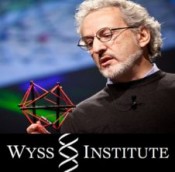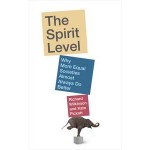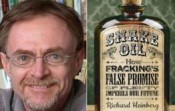Q&A: Don Ingber – Innovation Inspired by Nature
Written on June 18th, 2014 |
Aired 05/06/12
After 3.8 billion years of R&D on this planet, failures are fossils. What surrounds us in the natural world is what has succeeded and survived. So why not learn as much as we can from what works? Nature, imaginative by necessity, has already solved many of the problems we are grappling with. Animals, plants, and microbes are the consummate engineers. They have found what works, what is appropriate, and most important, what lasts here on Earth.
In January 2009, Harvard received the largest philanthropic gift in its history — $125M — to create the Wyss Institute for Biologically Inspired Engineering, and today’s guest is its founding director, DON INGBER. I find this whole notion of imitating nature one of the most exciting developments in human activity and something that gives me great hope.
The human body is an engineering marvel that maintains its balance while executing complicated movements, and senses and adapts to heat and cold. Every 20 seconds, it circulates blood through its extremities. Its cells are able to replace wounded tissue, find and destroy dangerous invaders, and interconnect to produce thoughts and emotions. Our bodies – and all living systems – accomplish tasks far more sophisticated and dynamic than any entity yet designed by humans. By emulating nature’s principles for self-organizing and self-regulating, Wyss researchers develop innovative engineering solutions for healthcare, energy, architecture, robotics, and manufacturing.
Free Forum Q&A – TIM DECHRISTOPHER: Civil disobedience (bidding) at public lands auction landed him 21 months in prison
Written on May 25th, 2014 |
Aired: 6/30/13
On December 19, 2008 TIM DeCHRISTOPHER disrupted a highly disputed BLM auction, effectively safeguarding thousands of acres of land. Not content to merely protest outside, Tim entered the auction hall and registered as bidder #70. He outbid industry giants on land parcels (which, starting at $2 an acre, were adjacent to national treasures like Canyonlands National Park), winning 22,000 acres of land worth $1.7 million Two months later, incoming Interior Secretary Ken Salazar invalidated the auction. Yet DeChristopher was indicted and tried on two federal felonies and spent 21 months in prison.
Released in April 2013, DeChristopher is the subject of documentary film, Bidder 70, which opened this weekend at the Music Hall in Beverly Hills and other theaters around the country. He joins me this week to tell his story. What led him to that auction? What went through his mind as he began bidding and winning? Why didn’t he take a plea deal? What was his experience in prison? What message does he have for others?
We’ll also talk about the state of the movements to deal with energy, environment, and climate change, in light of Obama’s recent speech and the eventual decision whether or not to build the KeystoneXL pipeline.
“At this point of unimaginable threats on the horizon, this is what hope looks like. In these times of a morally bankrupt government that has sold out its principles, this is what patriotism looks like. With countless lives on the line, this is what love looks like, and it will only grow…
— From Tim DeChristopher’s statement to the court at his sentencing hearing
Q&A: RICHARD WILKINSON & KATE PICKETT, Authors – The Spirit Level: Why More Equal Societies Almost Always Do Better
Written on March 2nd, 2014 |
Originally Aired: 01/31/10
RICHARD WILKINSON & KATE PICKETT authors of an important new book: The Spirit Level: Why More Equal Societies Almost Always Do Better
In the UK, the Guardian says The Spirit Level “might be the most important book of the year, and The New Statesman named it one of the top ten books of the past decade.
Based on thirty years’ research, The Spirit Level shows that unequal societies are bad for the well-off as well as the poor, when it comes to health and social problems, child well being, life expectancy, infant mortality, obesity, educational scores, drop out rates, illegal drug use, mental illness, homicide, incarceration, CO2 emissions, recycling, social mobility, innovation, and levels of trust.
The good news: If all these ills are related to one measure – income inequality, then, decreasing inequality should be the central goal of our politics because we can be confident that it works.
RICHARD WILKINSON has played a leading role in international research on inequality. He studied economic history at the London School of Economics before training in epidemiology, and is Professor Emeritus at the University of Nottingham Medical School and Honorary Professor at University College London.
KATE PICKETT is a senior lecturer at the University of York and a National Institute for Health Research Career Scientist. She studied physical anthropology at Cambridge, nutritional sciences at Cornell and epidemiology at Berkeley before spending four years as an Assistant Professor at the University of Chicago.
Free Forum Q&A: SARAH VanGELDER Editor-in-Chief, YES! Magazine 10 Hopeful Things That Happened in 2013
Written on January 7th, 2014 |
Aired 01/05/14
These days the media are full of lists – the best and worst of 2013 – movies, TV, music, books, etc. as well as lists of resolutions and tips for 2014. So when I got an email from SARAH VanGELDER, co-founder and editor-in-chief of YES! Magazine, in which she wrote. “I just posted my end-of-year column on the stories from 2013 that could make 2014 transformative,” , I invited her to join me today. She actually titled her article, “10 Hopeful Things That Happened in 2013 to Get You Inspired for What’s to Come,” and that sounds like a great conversation to start the new year.
We’ll look back and ahead with an eye toward catching the waves or the winds of change, building on the best of last year to make 2014 even better. Let’s commit to taking action to move us all a bit closer to a world that just might work.
Free Forum Q&A – RICHARD HEINBERG, Author of SNAKE OIL: Fracking’s Promise of Plenty Imperils Our Future
Written on December 3rd, 2013 |
Aired: 12/1/13
What do you know about hydraulic fracturing or “fracking” of natural gas?Probably depends on who you’re listening to. The fossil fuel industry tells you it’s the biggest energy development of the century, which promises America energy independence for the US and a huge boost to our economy with benefits to local economies. Many of the communities themselves tell a different story – of pollution on the one hand and social disruption on the other.
For the spoils of success, I recommend an article in March 2013 Harpers, Where Broken Hearts Stand, Grief and Recovery on the Badlands of North Dakota by Richard Manning.
RICHARD HEINBERG has a new book, SNAKE OIL: How Fracking’s Promise of Plenty Imperils Our Future, looks at fracking from both economic and environmental perspectives, informed by the most thorough analysis of shale gas and oil drilling data ever undertaken.
Join us as I try to find out, Is fracking the miracle cure-all to our energy ills, or a costly distraction from the necessary work of reducing our fossil fuel dependence?
